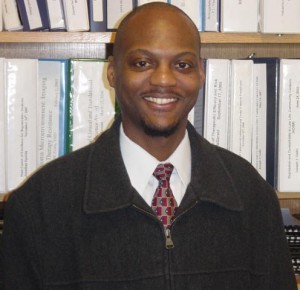To follow up our Biomedical Career Fair held on October 3rd, we welcomed Dr. Caleph Wilson to @PennCareerDay on Twitter for two days, Tuesday, October 9th and Wednesday, October 10th. Dr. Wilson, also known as @HeyDrWilson, talked about his work as a Biomedical Postdoctoral Research Fellow here at Penn. It was a great opportunity to learn about this path, whether you’re a current PhD candidate, a postdoc or an undergrad interested in biomedical research. To learn more about Dr. Wilson, read his bio below, and check out his tweets on our Storify page.
 Dr. Caleph B. Wilson is a postdoctoral scholar in the Abramson Cancer Research Institute and the Department of Microbiology of the Perelman School of Medicine at the University of Pennsylvania. Dr. Wilson investigates immunological therapies to develop treatments for cancer and HIV infections. Specifically, his work seeks to genetically modify patient T cells, and transform the T cells to more effectively kill HIV infected cells and malignant tumors.
Dr. Caleph B. Wilson is a postdoctoral scholar in the Abramson Cancer Research Institute and the Department of Microbiology of the Perelman School of Medicine at the University of Pennsylvania. Dr. Wilson investigates immunological therapies to develop treatments for cancer and HIV infections. Specifically, his work seeks to genetically modify patient T cells, and transform the T cells to more effectively kill HIV infected cells and malignant tumors.
Before coming to Penn, Dr. Wilson earned his doctorate in Pathobiology at the University Park Campus of the Pennsylvania State University and his undergraduate degree in Biology from Alcorn State University. Through engaging in investigative research as an undergraduate, graduate student and postdoc, Dr. Wilson has fully immersed himself in the biological sciences, fulfilling his lifelong goal to investigate and eliminate human diseases. In addition to his laboratory studies, Dr. Wilson is also a co-chair of the Biomedical Postdoctoral Council. As co-chair he seeks to represent University of Pennsylvania postdocs on campus, in the local community and nationally.
Receiving great mentoring has been a major cornerstone of Dr. Wilson’s progression from a small southern town to producing scholarly work at the University of Pennsylvania. As a result, he has prioritized mentoring undergraduates, graduate students and fellow postdocs. He envisions that the science, technology, engineering and math (STEM) fields will lead all future industries in the U.S. and globally. This interest in the development of the future of STEM drew Dr. Wilson to follow policy developments in the scientific world. He took this interest one step further and last year served as a Public Policy Fellow for the American Association of Immunologists.
Overall, Dr. Wilson hopes to impact society by developing successful therapies to eradicate cancers and HIV infections. Further, he seeks to cultivate and support talented students into STEM fields and assist them in becoming lifelong scientists.


